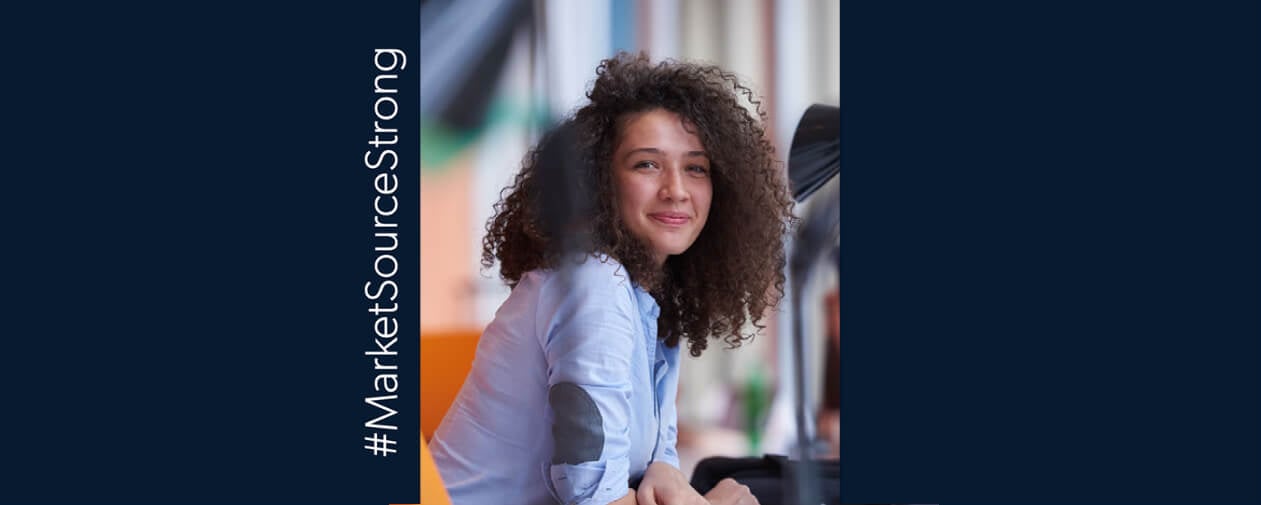At MarketSource, an intentional, decades-long commitment to creating a culture that fuels outperforming teams persists to this day. When Allegis Group acquired MarketSource in 2004, they combined the cultures to get the best of both. What emerged were four core values that have not only endured, but helped our customers and team members flourish.
I sat down with four members of the executive leadership team to find out why they believe, nearly 20 years later, the MarketSource culture is thriving, even as the world around us changes.
Rick Haviland, President (27 years)
Mark Mueller, Chief Financial Officer (24 years)
Chris Walter, VP of Strategic Enterprise Services (19 years)
Shelton Guinn, VP of Human Resources (25 years)
Their collective tenure reaches nearly 100 years.
MarketSource Core Values:
Relationships
Open Communication
Work Ethic
Serving Others
Sarah: How would you describe the MarketSource culture?
Rick: We’re a high-performance, relationship-based company. With that comes an intense, competitive spirit, and we reward people for that performance with opportunities. Creating opportunities for our people fuels a flywheel of growth for both team members and customers, and is the most rewarding part of my job. We also find that people who are happy outside of work are our best performers. We can’t manufacture that for them, but we can give them balance, which increases that likelihood.
Shelton: MarketSource wants us to bring our “whole selves” to work, which means we’re not compartmentalizing our personal and our professional lives. I was skeptical at first, but as I started to take a chance and share more of myself, the response I received was pleasantly unexpected and sincere. A colleague told me, “I know you want to grow and progress, but if you try to do it on your own, it will take you longer. The more I get to know you, the better I can help you get where you want to be.”
Mark: It’s a family away from my family. Our core values define how we interact with our peers, customers, and teams. Those values remind us we’re accountable to others. They also give us a foundation and a framework that, when things go wrong, enables us to work together to come up with a win-win solution that benefits everyone. That collaborative spirit is in large part possible because of our culture.
Chris: It’s a culture of mutual accountability and respect, in which team members feel a sense of duty to support each other. We encourage leadership at every level and believe that everyone, whether a manager or an individual contributor, can set an example for others and seize the opportunity to add value. While this environment enables our internal relationships, it also fuels an outperforming mindset that benefits our customers. Our relationships foster open communication and help drive better business outcomes. If we see an area of opportunity, for example, our culture allows us to address and resolve those issues quickly, so they don’t become roadblocks to success.
Sarah: What makes MarketSource’s culture unique?
Chris: Throughout our hiring process, demonstrating character and being a cultural fit are equally essential to having the right skills and experience. We’ve found this practice is key to people being successful here. Also, rather than centering our culture around building up/serving the leader(s), by making the greater good of the team and our communities our bullseye, we’re able to perpetuate a constructive, healthy culture where everyone has the opportunity to win, and where people genuinely care for each other and want others to be successful. It also allows us to both absorb our hurdles and disappointments; and to buoy our joys and wins.
Shelton: No matter our position, we are all bound by a mutual commitment to our core values. They fuel our individual and collective growth, and drive us to help each other grow.
Mark: How we support our teams is unique. We’re not employees of a big machine. We truly believe in, and care about, each other on a personal level and want to help each other grow. We also run every business decision through a “How are you serving others (internally and externally) with this decision?” filter, ensuring everyone wins. It creates a flywheel effect, strengthening the team, which strengthens the culture, which helps us deliver for our customers.
Rick: Allegis Group’s founders took a brilliant, yet simple, approach. They hired people who had strong character and were willing to – not just outwork – but outcare the competition. They realized early on that, no matter what business we were in, if that business revolved around these core principles, we’d be successful and could create opportunities both for our customers and our team. Our early “whenever, wherever, whatever it takes” mantra persists to this day.
“We hire people who are willing to—not just outwork—but outcare the competition.”
– Rick Haviland, President
Sarah: When do team members begin to learn the company’s core values? How/when does leadership communicate them?
Rick: We spend a tremendous amount of time on culture during orientation. Leaders actually share their stories about how to put our core values into practice and how doing so has impacted them in meangingful ways. We also build our values into goal setting and our performance-based appraisal process. In our quarterly communication from executive leadership, we share an organizational health update, which includes culture. We also regularly spotlight team members on our website and in social media and have a robust employee recognition and award program. And when we think about promotions, one of the first things we look at is what kind of relationships and legacy that person has created with their team members.
Shelton: We work to be transparent about our culture in the interview process and to hire people with shared values because our jobs may evolve daily, but our core values don’t change. Everyone benefits when our values align.
“We aim to foster family, friendships, and deep personal and professional relationships that help us win at work and life.”
– Rick Haviland, President
Sarah: Which core value do you think is most important and why?
Rick: Relationships. They’re the foundation of how we’re able to ask so much from each other, which creates growth and opportunity. Relationships also enable the other core values. The deeper the relationship, the deeper our trust. This, in turn, fosters open communication, which makes us more productive and able to make decisions faster. Relationships also increase our productivity and accountability to each other, because we’re more likely to want to work hard for people we have good relationships with. The same truth applies to serving others. We’re more likely to invest in those with whom we have strong relationships and to look for opportunities to serve them more often.
Chris: Relationships. People begin to feel like they’re working with a family, which deepens their loyalty and incentive to support others and strive for the good of the group. This commitment to each other benefits our clients because it means our people, who are representing their brand, are living this kind of culture – a cohesive team, bonded by common values – rather than a dysfunctional team who’s out for themselves and operates from a place of negativity.
Sarah: Clearly, our core values are more than just words on a website. Why are MarketSource team members so committed to living our core values?
Chris: They’re living words. People live it, and it’s genuine. It goes back to our origins. If we don’t get the culture right, then we’ll fail in every other area. It’s the kind of environment people enjoy. People begin to feel like they’re working with a family, which deepens their loyalty and incentive to support others and strive for the good of the group. No matter what your position, our culture is both empowering and liberating. It’s empowering to know you’re accountable to others. And it’s liberating to know you don’t have to stand on your own or be perfect. Most of us feel a sense of duty to support and set a good example for each other.
Rick: It starts with the hiring process. When we do it right, people quickly come to love it here, and they thrive. We also promote people who exhibit our values. When our teams witness that, they see the high currency leadership places on values, which reinforces them. We also strive to stick to our cultural foundations, even when they get challenged, because it’s important for us to show that we don’t abandon them when things get tough. At the same time, we evaluate our cultural pillars regularly to discern when the culture needs to hold firm and when it needs to evolve.
Sarah: Tell me about the Team Rule. What difference have you seen it make to you? To others?
Chris: The Team Rule drives better business outcomes – especially when we practice it with customers. It gives us the framework to address those issues with the client and resolve them quickly, so they don’t stand in the way of us achieving goals for our customers.
Rick: It is simple and extremely effective; however, it isn’t necessarily easy. Letting your partners know how they are impacting you and those around you can be both challenging and rewarding at the same time. I have relied on it my entire career. The Team Rule strengthens relationships, improves productivity, and eliminates wasted energy and time.
Shelton: The Team Rule is about relying on open communication to have difficult conversations. It’s also about individuals building better relationships. We encourage team members to work through their grievances with each other directly—within 24 hours—rather than involving HR. And it can occur between people at any level because leadership is accountable, too. What usually happens is that one conversation partner didn’t realize how they impacted the other person.
The Team Rule: “Every person, regardless of their position, is obligated to tell others how they impact them. Those feelings and ‘facts,’ when they seem important for one’s personal or professional development, will be given in a caring spirit. This information will be received as a sign of respect.”
Mark: Within my first 90 days, my supervisor invoked the Team Rule. He told me he didn’t think I was going to make it. My response was to defend my accomplishments, to which he replied that I was missing the point. He asked me what my peers and direct reports thought about my work, what they’d say my strengths and weaknesses were, what theirs were. I couldn’t answer him because I hadn’t built the relationships. After all, why would I clue in my peers, with whom I was competing for future promotions, to my weaknesses, which they could then exploit to get ahead of me? My boss asked me why I would limit myself to looking out for my career when I could have a whole team looking out for me. When I went home that night, I told my wife I was probably going to get fired. Instead, I spent the next six months rewiring myself to become vulnerable to my colleagues. Here I am, 24 years later, with a rewarding career and meaningful relationships. Being vulnerable is hard, but it’s profoundly worth it.
Beyond Business Outcomes
Helping our clients achieve their goals is a top priority. At the same time, we’ve found that when we pursue those goals through the lens of our core values, we’re able to go beyond business outcomes to overperform for them, to build enduring relationships, and to create new opportunities along the way.
“We’re not afraid to fail fast, to learn from our mistakes, and move forward.”
– Rick Haviland, President
Ready to talk?
If you want to work with a partner who doesn’t compromise on what matters…


